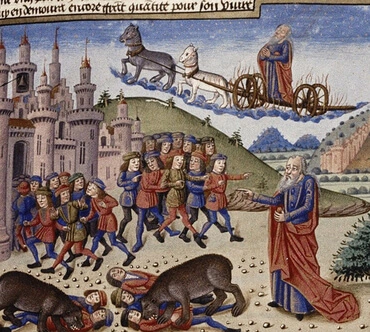Elisha and the Bears
Napsal(a) Brian David
This video is a product of the New Christian Bible Study Corporation. Follow this link for more information and more explanations - text, pictures, audio files, and videos: www.newchristianbiblestudy.org

Critics of the Bible often refer to this story, pointing to it as a reason to dismiss the Bible as a holy book. Their argument is pretty straightforward: If Elisha would cause bears to attack children – 42 children! – for insulting his hairless head, how can we regard him as a good person? He is described as a "Man of God," but what kind of God would want this?
Or put it this way: "Sticks and stones may break my bones but words will never hurt me" – unless I use words on Elisha, in which case I’m bear-bait.
Ironically, the story’s internal meaning – the spiritual lesson it's teaching us -- has to do with people who mock and criticize the Bible because of its sometimes-strange stories, and with the damage they do to themselves by such attacks.
Let’s look closely at each part of the story.
The Writings tell us that "Elisha" represents the Lord as He is revealed to us through the Bible. "Hair," in general, represents true ideas in their most outward expression. Elisha’s hair, then, represents the most outward expression of the Lord in the Bible, or the actual, literal stories themselves. This means that calling Elisha “bald” is saying that the Lord is not getting through into those actual, literal stories – that the stories are empty, without real meaning. “Youths” generally represent intelligence or the understanding of truth. Here it is presumably used in a negative way, showing people using intelligence and logic to attack the meaning of the Bible.
“Bears” represent the power of the literal, external stories of the Bible. In most cases this is negative – bears represent that power without a connection to the stories’ internal meanings – but in this case it is a powerful protection.
Finally, the number “42” represents blasphemy, or direct attacks against the Lord.
Put that together, and we can see that this is not a story about Elisha siccing bears on some bratty kids. It is really a story about the dangers of using our intelligence to attack the Bible, and through the Bible the Lord.
The Bible, even in its most external form, has tremendous power. It’s a power we can feel and understand if we approach the Bible with a genuine openness to the Lord, but it’s not a power we can understand through pure logic or pure intelligence. And if we use pure logic and pure intelligence to attack the Bible, we will get “mauled” – our ability to understand truth will be reduced to render us less of a threat to holy things.







